Comparing & Contrasting Bush and Reagan: Policies & Leadership
VerifiedAdded on 2023/06/11
|5
|1046
|382
Essay
AI Summary
This essay provides a comparative analysis of the political approaches, policies, and leadership styles of Presidents George H.W. Bush and Ronald Reagan. It explores the similarities and differences in their domestic and international policies, with a focus on economic strategies and relations with communist countries. The essay highlights Reagan's influence on Bush's policies, particularly in fiscal matters, while also noting the divergences, such as Bush's more lenient approach towards Soviet nations. The analysis considers the different political, social, and economic contexts in which each president served, ultimately concluding that while Bush was influenced by Reagan, he also charted his own course in response to evolving global dynamics. Desklib provides access to similar solved assignments for students.
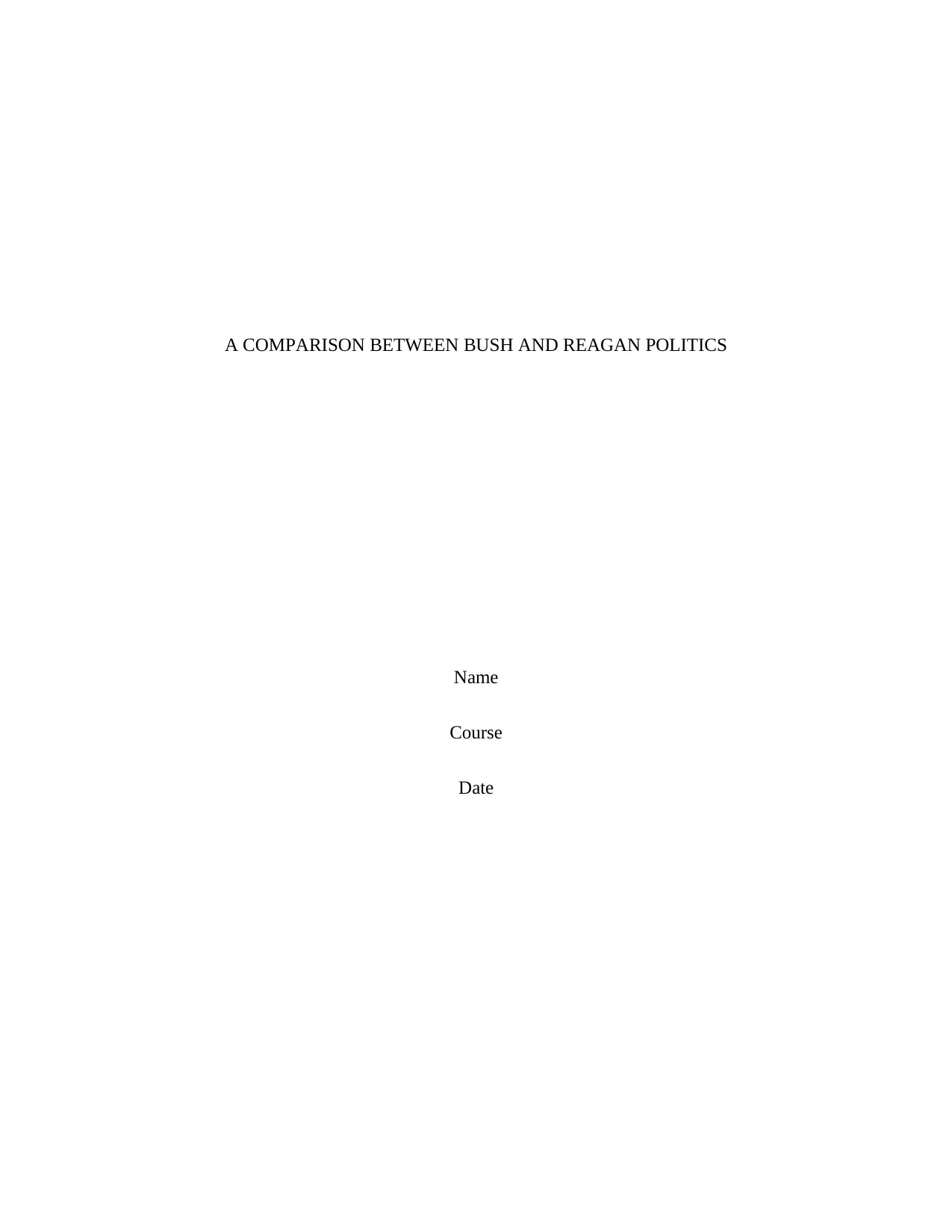
A COMPARISON BETWEEN BUSH AND REAGAN POLITICS
Name
Course
Date
Name
Course
Date
Paraphrase This Document
Need a fresh take? Get an instant paraphrase of this document with our AI Paraphraser
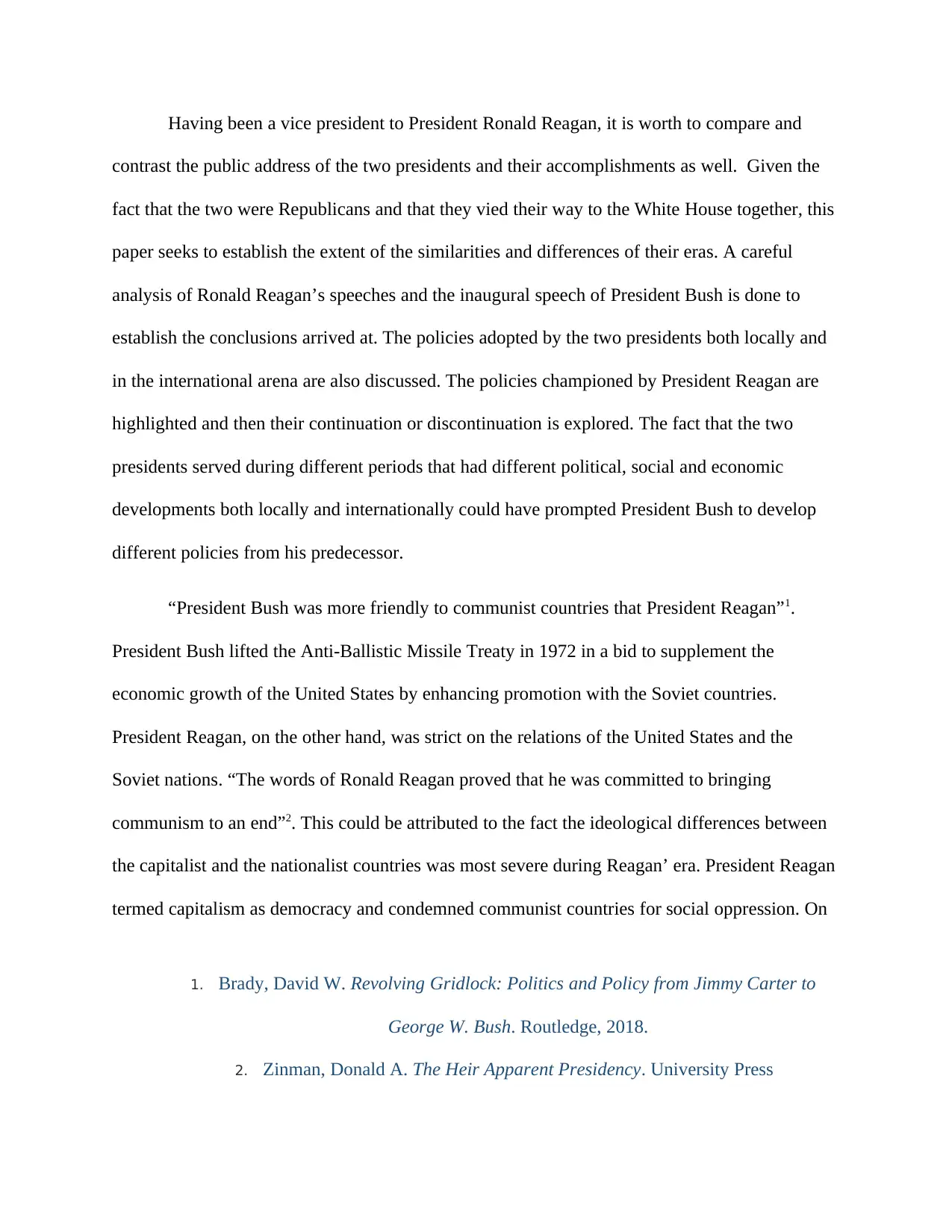
Having been a vice president to President Ronald Reagan, it is worth to compare and
contrast the public address of the two presidents and their accomplishments as well. Given the
fact that the two were Republicans and that they vied their way to the White House together, this
paper seeks to establish the extent of the similarities and differences of their eras. A careful
analysis of Ronald Reagan’s speeches and the inaugural speech of President Bush is done to
establish the conclusions arrived at. The policies adopted by the two presidents both locally and
in the international arena are also discussed. The policies championed by President Reagan are
highlighted and then their continuation or discontinuation is explored. The fact that the two
presidents served during different periods that had different political, social and economic
developments both locally and internationally could have prompted President Bush to develop
different policies from his predecessor.
“President Bush was more friendly to communist countries that President Reagan”1.
President Bush lifted the Anti-Ballistic Missile Treaty in 1972 in a bid to supplement the
economic growth of the United States by enhancing promotion with the Soviet countries.
President Reagan, on the other hand, was strict on the relations of the United States and the
Soviet nations. “The words of Ronald Reagan proved that he was committed to bringing
communism to an end”2. This could be attributed to the fact the ideological differences between
the capitalist and the nationalist countries was most severe during Reagan’ era. President Reagan
termed capitalism as democracy and condemned communist countries for social oppression. On
1. Brady, David W. Revolving Gridlock: Politics and Policy from Jimmy Carter to
George W. Bush. Routledge, 2018.
2. Zinman, Donald A. The Heir Apparent Presidency. University Press
contrast the public address of the two presidents and their accomplishments as well. Given the
fact that the two were Republicans and that they vied their way to the White House together, this
paper seeks to establish the extent of the similarities and differences of their eras. A careful
analysis of Ronald Reagan’s speeches and the inaugural speech of President Bush is done to
establish the conclusions arrived at. The policies adopted by the two presidents both locally and
in the international arena are also discussed. The policies championed by President Reagan are
highlighted and then their continuation or discontinuation is explored. The fact that the two
presidents served during different periods that had different political, social and economic
developments both locally and internationally could have prompted President Bush to develop
different policies from his predecessor.
“President Bush was more friendly to communist countries that President Reagan”1.
President Bush lifted the Anti-Ballistic Missile Treaty in 1972 in a bid to supplement the
economic growth of the United States by enhancing promotion with the Soviet countries.
President Reagan, on the other hand, was strict on the relations of the United States and the
Soviet nations. “The words of Ronald Reagan proved that he was committed to bringing
communism to an end”2. This could be attributed to the fact the ideological differences between
the capitalist and the nationalist countries was most severe during Reagan’ era. President Reagan
termed capitalism as democracy and condemned communist countries for social oppression. On
1. Brady, David W. Revolving Gridlock: Politics and Policy from Jimmy Carter to
George W. Bush. Routledge, 2018.
2. Zinman, Donald A. The Heir Apparent Presidency. University Press
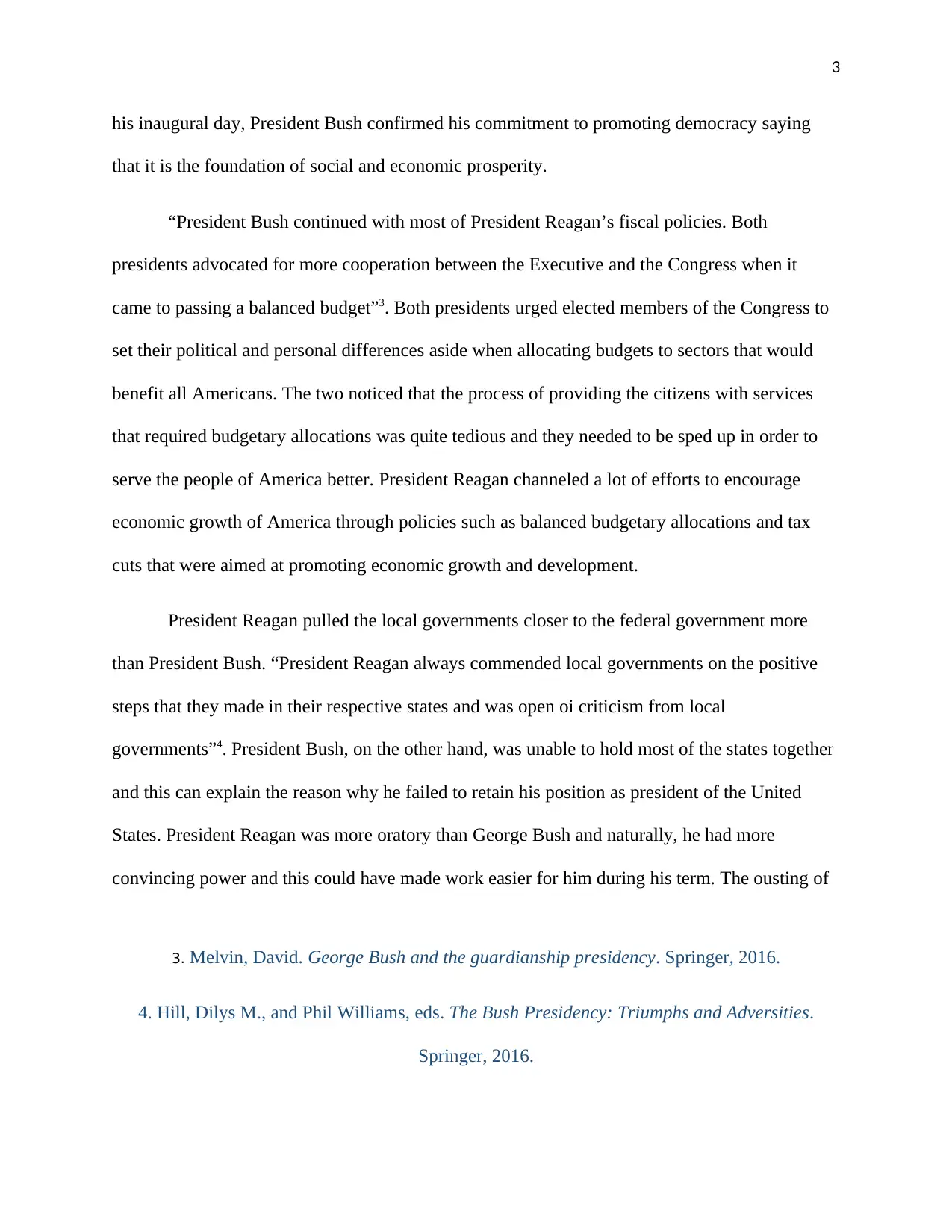
3
his inaugural day, President Bush confirmed his commitment to promoting democracy saying
that it is the foundation of social and economic prosperity.
“President Bush continued with most of President Reagan’s fiscal policies. Both
presidents advocated for more cooperation between the Executive and the Congress when it
came to passing a balanced budget”3. Both presidents urged elected members of the Congress to
set their political and personal differences aside when allocating budgets to sectors that would
benefit all Americans. The two noticed that the process of providing the citizens with services
that required budgetary allocations was quite tedious and they needed to be sped up in order to
serve the people of America better. President Reagan channeled a lot of efforts to encourage
economic growth of America through policies such as balanced budgetary allocations and tax
cuts that were aimed at promoting economic growth and development.
President Reagan pulled the local governments closer to the federal government more
than President Bush. “President Reagan always commended local governments on the positive
steps that they made in their respective states and was open oi criticism from local
governments”4. President Bush, on the other hand, was unable to hold most of the states together
and this can explain the reason why he failed to retain his position as president of the United
States. President Reagan was more oratory than George Bush and naturally, he had more
convincing power and this could have made work easier for him during his term. The ousting of
3. Melvin, David. George Bush and the guardianship presidency. Springer, 2016.
4. Hill, Dilys M., and Phil Williams, eds. The Bush Presidency: Triumphs and Adversities.
Springer, 2016.
his inaugural day, President Bush confirmed his commitment to promoting democracy saying
that it is the foundation of social and economic prosperity.
“President Bush continued with most of President Reagan’s fiscal policies. Both
presidents advocated for more cooperation between the Executive and the Congress when it
came to passing a balanced budget”3. Both presidents urged elected members of the Congress to
set their political and personal differences aside when allocating budgets to sectors that would
benefit all Americans. The two noticed that the process of providing the citizens with services
that required budgetary allocations was quite tedious and they needed to be sped up in order to
serve the people of America better. President Reagan channeled a lot of efforts to encourage
economic growth of America through policies such as balanced budgetary allocations and tax
cuts that were aimed at promoting economic growth and development.
President Reagan pulled the local governments closer to the federal government more
than President Bush. “President Reagan always commended local governments on the positive
steps that they made in their respective states and was open oi criticism from local
governments”4. President Bush, on the other hand, was unable to hold most of the states together
and this can explain the reason why he failed to retain his position as president of the United
States. President Reagan was more oratory than George Bush and naturally, he had more
convincing power and this could have made work easier for him during his term. The ousting of
3. Melvin, David. George Bush and the guardianship presidency. Springer, 2016.
4. Hill, Dilys M., and Phil Williams, eds. The Bush Presidency: Triumphs and Adversities.
Springer, 2016.
⊘ This is a preview!⊘
Do you want full access?
Subscribe today to unlock all pages.

Trusted by 1+ million students worldwide
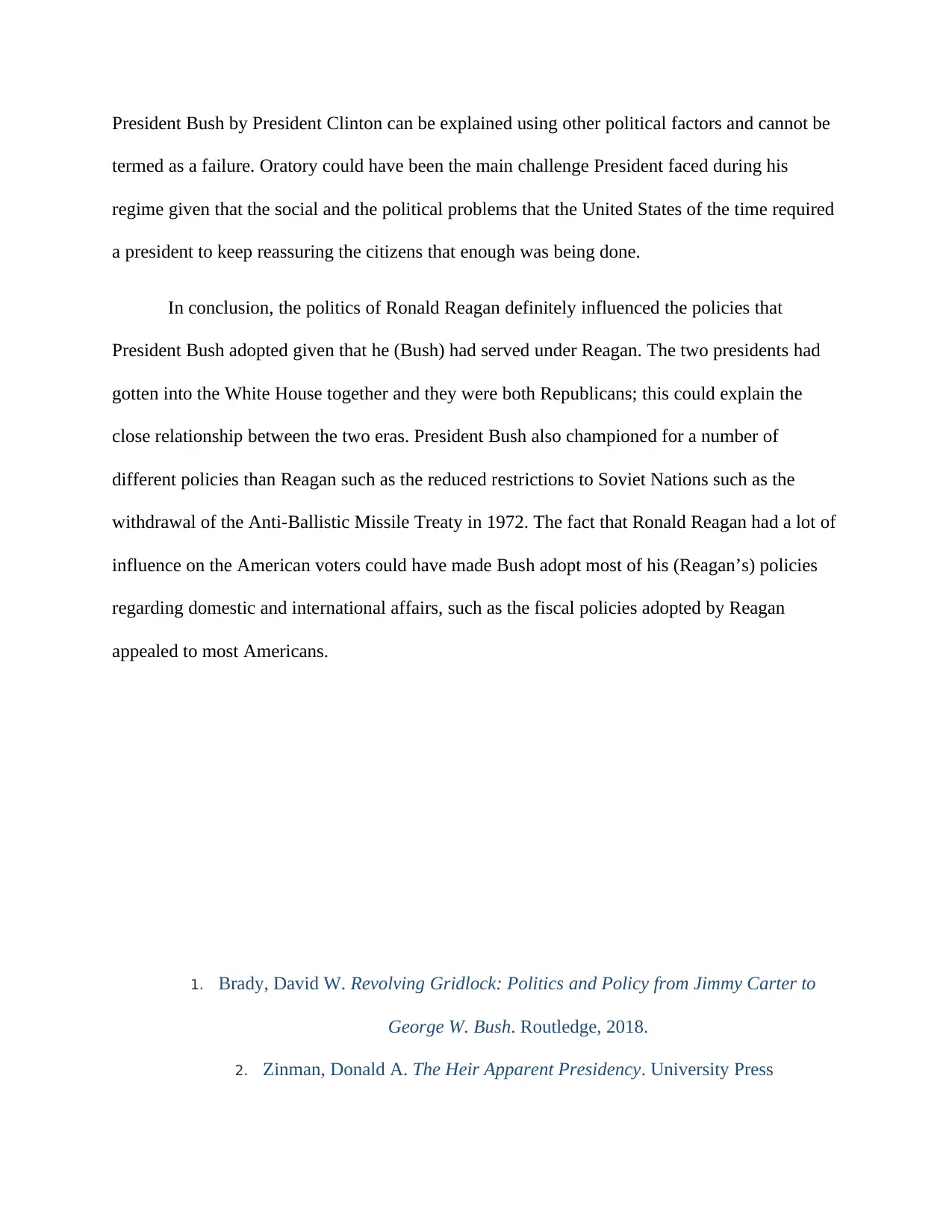
President Bush by President Clinton can be explained using other political factors and cannot be
termed as a failure. Oratory could have been the main challenge President faced during his
regime given that the social and the political problems that the United States of the time required
a president to keep reassuring the citizens that enough was being done.
In conclusion, the politics of Ronald Reagan definitely influenced the policies that
President Bush adopted given that he (Bush) had served under Reagan. The two presidents had
gotten into the White House together and they were both Republicans; this could explain the
close relationship between the two eras. President Bush also championed for a number of
different policies than Reagan such as the reduced restrictions to Soviet Nations such as the
withdrawal of the Anti-Ballistic Missile Treaty in 1972. The fact that Ronald Reagan had a lot of
influence on the American voters could have made Bush adopt most of his (Reagan’s) policies
regarding domestic and international affairs, such as the fiscal policies adopted by Reagan
appealed to most Americans.
1. Brady, David W. Revolving Gridlock: Politics and Policy from Jimmy Carter to
George W. Bush. Routledge, 2018.
2. Zinman, Donald A. The Heir Apparent Presidency. University Press
termed as a failure. Oratory could have been the main challenge President faced during his
regime given that the social and the political problems that the United States of the time required
a president to keep reassuring the citizens that enough was being done.
In conclusion, the politics of Ronald Reagan definitely influenced the policies that
President Bush adopted given that he (Bush) had served under Reagan. The two presidents had
gotten into the White House together and they were both Republicans; this could explain the
close relationship between the two eras. President Bush also championed for a number of
different policies than Reagan such as the reduced restrictions to Soviet Nations such as the
withdrawal of the Anti-Ballistic Missile Treaty in 1972. The fact that Ronald Reagan had a lot of
influence on the American voters could have made Bush adopt most of his (Reagan’s) policies
regarding domestic and international affairs, such as the fiscal policies adopted by Reagan
appealed to most Americans.
1. Brady, David W. Revolving Gridlock: Politics and Policy from Jimmy Carter to
George W. Bush. Routledge, 2018.
2. Zinman, Donald A. The Heir Apparent Presidency. University Press
Paraphrase This Document
Need a fresh take? Get an instant paraphrase of this document with our AI Paraphraser
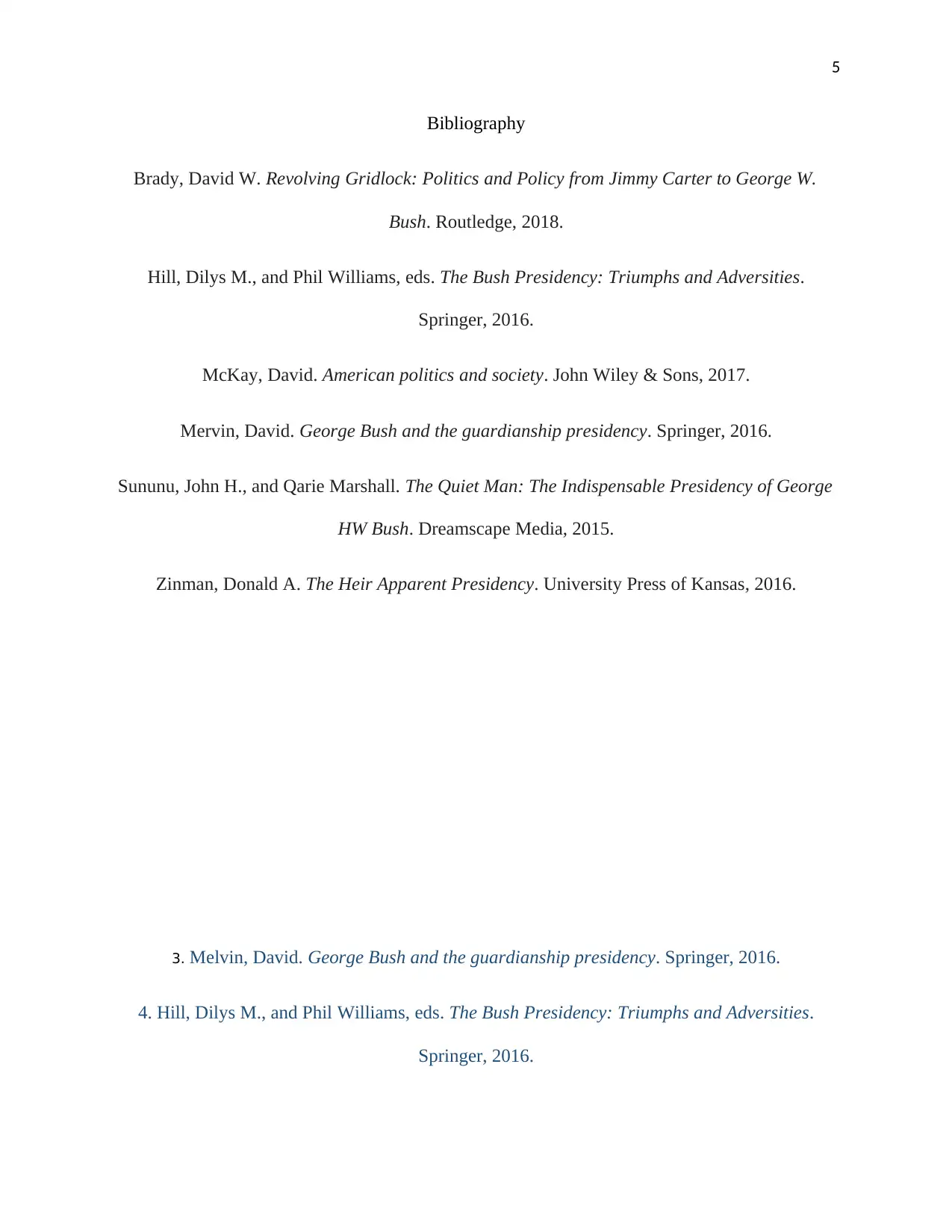
5
Bibliography
Brady, David W. Revolving Gridlock: Politics and Policy from Jimmy Carter to George W.
Bush. Routledge, 2018.
Hill, Dilys M., and Phil Williams, eds. The Bush Presidency: Triumphs and Adversities.
Springer, 2016.
McKay, David. American politics and society. John Wiley & Sons, 2017.
Mervin, David. George Bush and the guardianship presidency. Springer, 2016.
Sununu, John H., and Qarie Marshall. The Quiet Man: The Indispensable Presidency of George
HW Bush. Dreamscape Media, 2015.
Zinman, Donald A. The Heir Apparent Presidency. University Press of Kansas, 2016.
3. Melvin, David. George Bush and the guardianship presidency. Springer, 2016.
4. Hill, Dilys M., and Phil Williams, eds. The Bush Presidency: Triumphs and Adversities.
Springer, 2016.
Bibliography
Brady, David W. Revolving Gridlock: Politics and Policy from Jimmy Carter to George W.
Bush. Routledge, 2018.
Hill, Dilys M., and Phil Williams, eds. The Bush Presidency: Triumphs and Adversities.
Springer, 2016.
McKay, David. American politics and society. John Wiley & Sons, 2017.
Mervin, David. George Bush and the guardianship presidency. Springer, 2016.
Sununu, John H., and Qarie Marshall. The Quiet Man: The Indispensable Presidency of George
HW Bush. Dreamscape Media, 2015.
Zinman, Donald A. The Heir Apparent Presidency. University Press of Kansas, 2016.
3. Melvin, David. George Bush and the guardianship presidency. Springer, 2016.
4. Hill, Dilys M., and Phil Williams, eds. The Bush Presidency: Triumphs and Adversities.
Springer, 2016.
1 out of 5
Related Documents
Your All-in-One AI-Powered Toolkit for Academic Success.
+13062052269
info@desklib.com
Available 24*7 on WhatsApp / Email
![[object Object]](/_next/static/media/star-bottom.7253800d.svg)
Unlock your academic potential
Copyright © 2020–2026 A2Z Services. All Rights Reserved. Developed and managed by ZUCOL.




